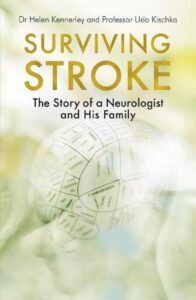A clinician and a stroke survivor will know different things about Cerebro-vascular accidents. Who better to demonstrate the differences than a consultant in stroke who has himself experienced a serious stroke? Udo Kischke was a consultant and professor in stroke medicine at the Oxford Centre for Enablement when, aged 62, he had a serious haemorrhagic stroke while running to catch a train. Despite noticing some slight symptoms, and that they were getting worse, he chose to keep travelling and get home, finally losing consciousness overnight. (Henry Marsh has written in And Finally about how doctors rationalise away their own symptoms: even symptoms that doctors would expect their patients to respond to as an emergency.)
Udo’s account of how his cerebral bleed affected him, and of his rehabilitation afterwards, is supplemented by his wife Helen’s story. The form of the book underlines the subtitle: ‘the story of a neurologist and his family’. Unlike Robert McCrum and his wife Sarah, both Udo and Helen are clinicians. (Helen is a clinical psychologist.) This informs Udo’s recovery from his CVA in a profound way. He and Helen have important knowledge about the brain’s ability to repair and rewire, so Udo is persistent in his exercises, for example to improve his foot drop and his speech. That knowledge also informs the family’s ability to be patient, to make allowances for Udo’s depression and irritability during the long-drawn out recovery. How different from many other families!
Udo had his own opinions about what forms of therapy would, or would not, be effective. When the occupational therapists suggested mirror-therapy to help him to move his paralysed arm, he was very sceptical. But the powerful optical illusion of seeing his working arm moving where he felt his affected arm to be successfully made connections he had not expected.
A recurring theme is the fatigue Udo experienced, as his brain changed and repaired. He was unable to socialise without needing rest before and afterwards. Rehabilitation itself meant there was little energy for being with the family. Helen vividly describes the disappointments of Udo’s adolescent children as he prioritised his recovery. This is a hard balance for any family, even one as informed as the Kischke household.
The personal experience of stroke is very different from a clinician’s knowledge about stroke. This is an obvious, yet profoundly important, message worth repeating again and again. Despite Udo’s knowledge of stroke, much of the experience shocked him. Hemianopia, where a black hole appears to swallow half of what he was looking at, even people’s faces, was truly distressing for him. It was embarrassing to be hoisted from bed to wheelchair. His paralysed left arm felt like something from the mortuary. Fear of falling, or of something going wrong, was always there. The pain in his unfeeling left arm, the continuing mistakes caused by his hemi-neglect, his helplessness: the vividness of all these realities shocked Udo. As he repeatedly said: ‘For over twenty years I’ve been advising people on stroke and I knew bugger all!’
I think this is essential reading for all clinicians who are involved in the rehabilitation of people after stroke. It would also be very helpful for family members who are watching a loved one go through this process, perhaps assisting them to become involved in positive ways.
Kennerley, Helen & Kischke, Udo (2020) Surviving Stroke: The Story of a Neurologist and his Family, London, Robinson (Little Brown Book Group)
